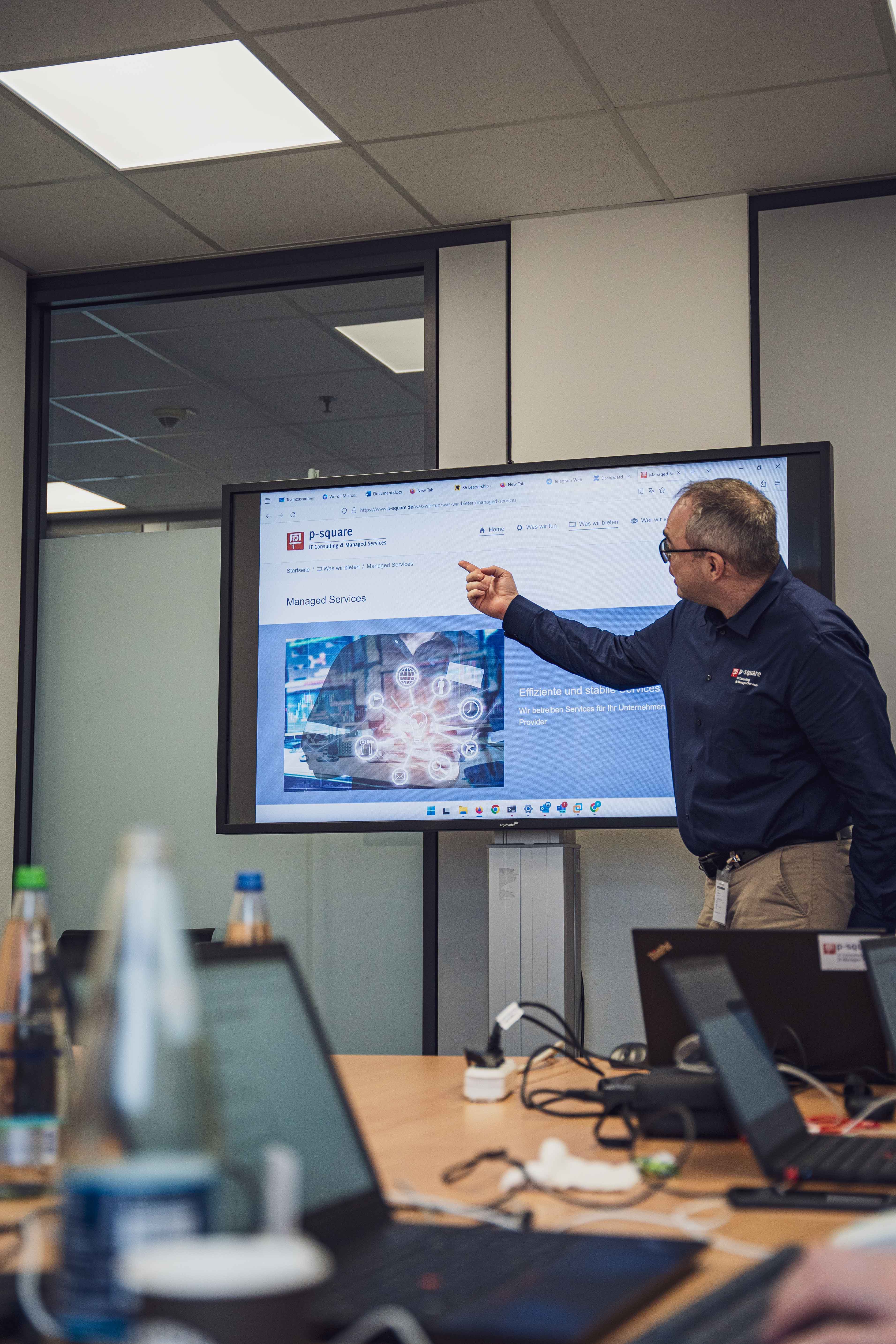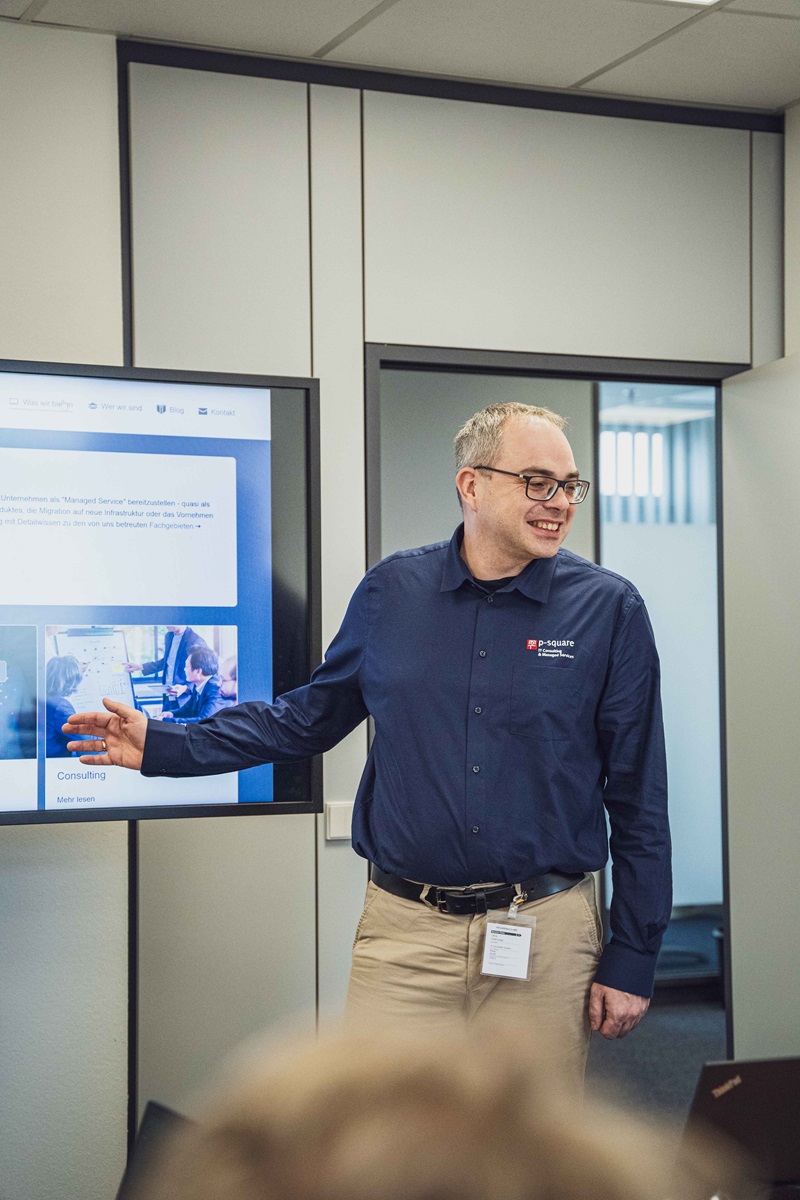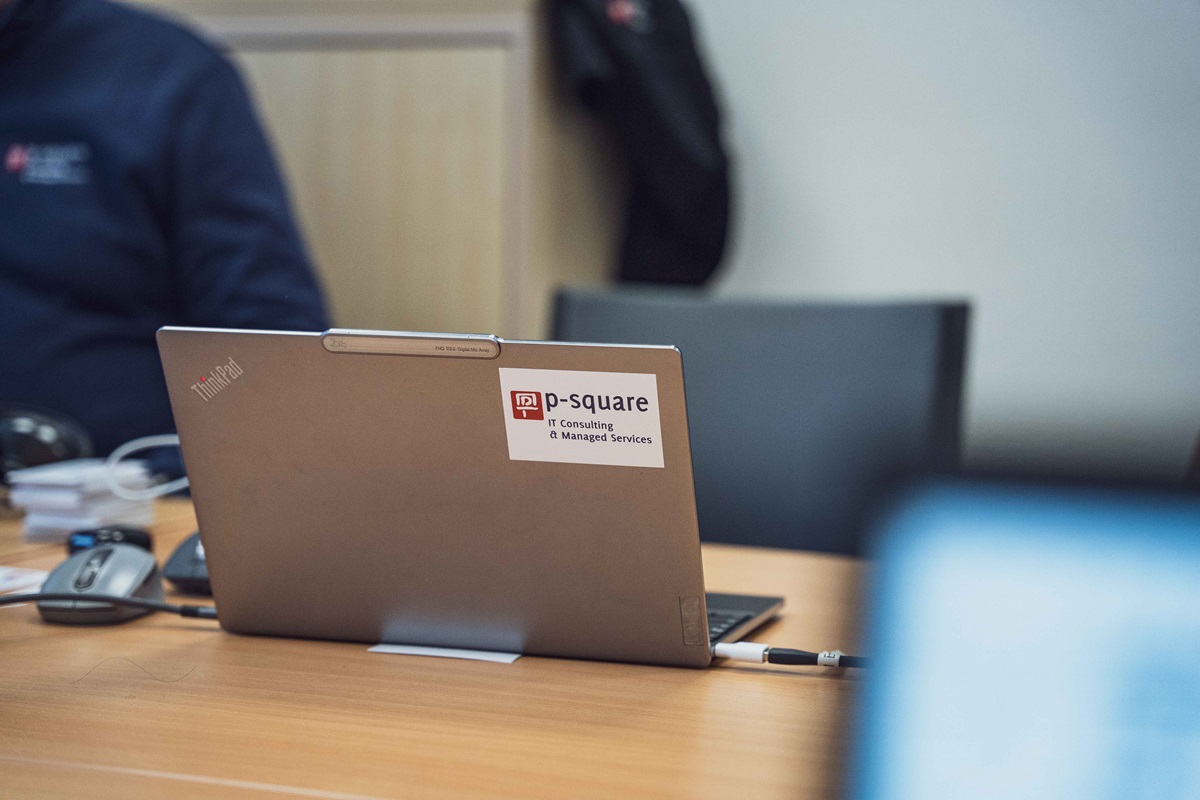Who is p-square and what do we offer?
p-square GmbH is an IT specialist!

p-square GmbH is THE IT specialist!
We offer a comprehensive service: from consulting, implementation and migration projects to the operation of complete services as a managed service provider.
- p-square was founded in 2004 and can draw on many years of experience
- p-square has more than 13 employees
- p-square is independent and fully self-financed
Our services and especially the expertise of our employees cannot simply be found in the Yellow Pages:
We offer specialist in-depth expert knowledge in areas of IT security.
• Managed services:
- Email, DNS, DDI (DDI, for example, is a combination of services that help you organise and manage your networks. A managed DDI service takes care of all these tasks to keep your network running smoothly without you having to worry about the details)
• E-Mail:
Imagine you have an email address like ‘meinname@meinefirma.com’. Managing this email service involves things like setting up new email accounts for employees, backing up emails so they don't get lost, and filtering spam to block unwanted messages. A managed email service ensures that your emails work securely and reliably without you having to worry about the technical details.
• DNS (Domain Name System):
When you visit a website, you usually type a domain name like ‘www.meinefirma.com’ into your web browser. The DNS is like a phone book of the internet that converts these domain names into the assigned IP addresses that indicate the actual locations of the websites. A managed DNS service takes care of managing this conversion, making sure your website is reachable under your domain name and helping to keep it secure.
• DDI (Dynamic Host Configuration Protocol (DHCP), Domain Name System (DNS), and Internet Protocol Address Management (IPAM)):
The DDI is a combination of services that help you organise and manage your networks. DHCP helps devices such as computers and mobile phones to automatically obtain IP addresses when they are connected to your network. DNS, as mentioned above, translates domain names into IP addresses. IPAM manages these IP addresses and helps assign and track them. A managed DDI service takes care of all these tasks to keep your network running smoothly without you having to worry about the details.

(copy 2)
Design, implementation and operation of Internet services (e.g. writing programme codes, integrating technologies, operating and maintaining services on servers, etc.).
• Design:
This refers to the planning and design of the Internet service. This involves analysing the requirements, designing the architecture and creating the user interface. The design defines the framework of how the service will function and how it will interact with users.
• Implementation:
Once the design has been finalised, the internet service is developed and implemented. This includes writing code, integrating technologies and implementing features according to the previously defined specifications. During implementation, bugs are fixed and tests are performed to ensure that the service works properly.
• Operation:
Once the internet service has been developed, it must be operated and maintained. This includes deploying the services on servers, monitoring performance and availability, fixing problems, updating software and ensuring the security of the service. Operating an internet service often requires a dedicated team to take care of the day-to-day operations and ensure that the service runs smoothly.

(copy 3)
Operation of email security and encryption (We ensure the secure communication of your company through the reliable operation of email security and encryption)
E-Mail-security:
This includes measures to protect emails from threats such as viruses, malware and phishing attacks. We use various security measures to ensure that your emails are secure. These include spam filters that block unwanted emails, anti-virus software that detects malicious attachments and firewalls that monitor email traffic to detect and block suspicious activity.
Encryption:
Encryption is a process by which messages are converted into a code that can only be decrypted by authorised persons. When operating email security and encryption, we use encryption technologies to ensure that confidential information in your emails is protected. This means that even if an email is intercepted, the information within the email remains unreadable to unauthorised persons.
We ensure and implement security measures to protect your email communications from threats and use technology to ensure that your confidential information remains protected, even when transmitted over the internet.
DevOps and cloud environments:
(Describes the collaboration between software development and IT operations. Traditionally, these two areas have worked separately, resulting in slow development cycles and software delivery issues. By combining DevOps practices and cloud technologies, companies can become more agile, develop innovative solutions and offer their customers a better service).
"DevOps and cloud environments" are two concepts that are closely linked and influence modern software development and delivery.
DevOps: DevOps is a working method that aims to improve collaboration between software development (Dev) and IT operations (Ops). Traditionally, these two areas have worked separately, resulting in slow development cycles and software delivery issues. DevOps promotes a culture of collaboration, automation and continuous improvement to make software development and delivery more efficient and reliable. With DevOps, teams can respond faster to customer feedback and deliver software faster while improving quality.
Cloud environments: The cloud refers to the provision of IT resources such as servers, storage and databases via the internet. Unlike traditional on-premises infrastructure, where companies have to buy and maintain their own servers and hardware, cloud environments can obtain these resources from cloud providers such as Amazon Web Services (AWS), Microsoft Azure or Google Cloud Platform. Cloud environments offer scalability, flexibility and cost efficiency as organisations only pay for the resources they actually use and are not responsible for owning and maintaining hardware.
If we consider both concepts together, ‘DevOps and cloud environments’ means that software development teams use the DevOps methodology to develop and deploy software faster and more reliably, while using cloud resources to host and operate their applications.
By combining DevOps practices and cloud technologies, organisations can become more agile, develop innovative solutions and provide a better service to their customers.
Our mission is simple:
We want to use our IT expertise, which is always kept up to date, to sustainably improve our customers' IT operations and IT landscape.
To this end, we have built up a highly qualified operations team with many years of experience and a strong background in automation. The focus is on Linux and the operation of Linux-based network services.